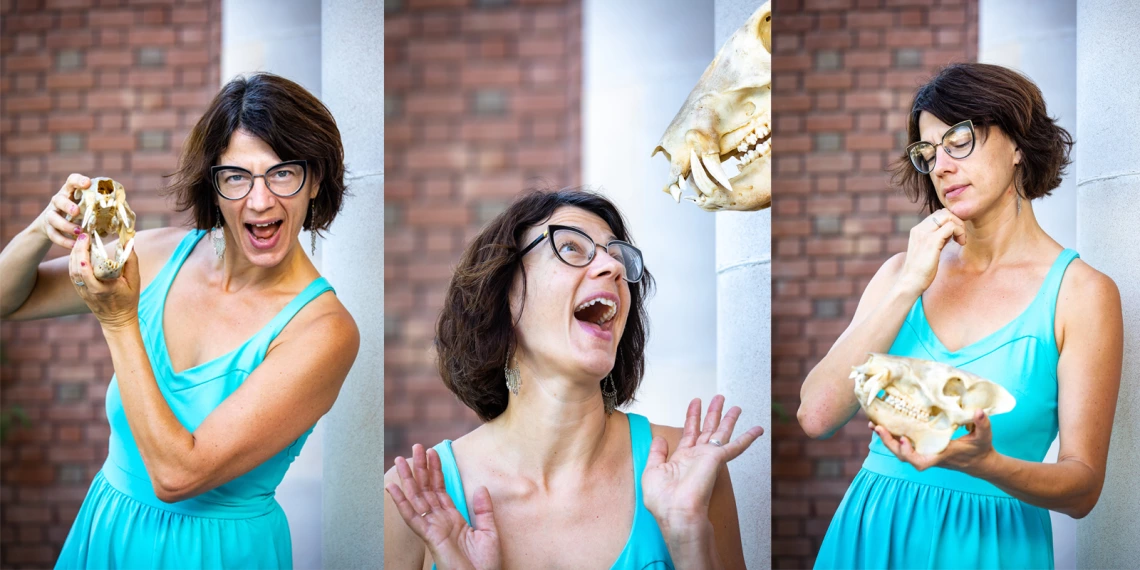“Super Dope” Women of Impact: Elise Gornish
Elise Gornish didn’t grow up believing she had what it takes to become a scientist. Now, she is a part of the inaugural class of Women of Impact, an awards program presented by the University of Arizona Department of Research, Innovation, and Impact.

Elise Gornish never thought she would be where she is today—a Cooperative Extension Specialist and early career leader in ecological restoration with more than 65 journal articles and 250 science presentations under her belt.
“I wasn't like a cradle scientist. I had a brother who was encouraged to do science and engineering and I was always told English and business, so that's what I did,” Gornish said. “I was in the business world for a couple of years, making good money, but I realized I wasn't happy. I thought, well what am I going to do?”
After making a list of things she liked – being alone, eating ice cream, being with plants – she realized she might like a career as a forest ranger.
“I didn't know anything about forestry or being a forest ranger. So I literally googled: how do you become a forest ranger? And there was all this stuff about ecology,” Gornish recalled. “And I had never seen that word before in my life, I didn't know what it meant. I had never taken a science course in my life, I wasn’t a good student.”
Nevertheless, she enrolled in night courses at Hunter College in New York City. The school didn’t have an ecology program but did offer cellular and molecular biology.
“It was the first time ever in my life that I was like whoa, I like this stuff. I started learning how the world worked, learning something tangible about the world around me, and I realized that I was doing really well,” Gornish said. “I was like oh, I’m not stupid. I'm not a bad student. Science is for me, even though I was told the complete opposite my whole life.”
Gornish threw herself into it. She got an internship with the Central Park Zoo, followed by another at the Natural History Museum, which turned into an internship in the Canadian arctic where she worked for three summers, and then she went to graduate school at Florida State University.
Along the hurricane torn coasts of Florida, Gornish cemented her love for ecological restoration. There she worked to replant decimated park lands with native vegetation.
“I installed this experiment in 2007 and five years later I went back, after several subsequent hurricanes, and the plots were still there and there were tons of butterflies all over the place,” Gornish said. “It's a very small thing, but you're like, oh this is real world for that butterfly. I don’t know, it’s just super dope.”
Gornish came to the University of Arizona in 2017 and still has a personal connection and excitement for the work she does on the ground in partnership with diverse community groups – including youth, the U.S. Forest Service, environmental non-profits, and ranchers. With her partners, Gornish works to restore drought-affected lands with native plants, supporting everything from butterflies and bees to wildlife and cattle grazing.
“We designed a seed bike so people can pelletize seeds really quickly and the Forest Service in Colorado is using it and they sent me a video of them making seed balls and starting the seeds out in the forest,” Gornish said. “People get really excited when this stuff works and not only are you getting excited, but you’re enhancing native plants on the landscape. It doesn't get any better than that.”
In 2019, Gornish established the UArizona Girls on outdoor Adventure for Science and Leadership program, or GALS for short, to address the gender and racial gaps in STEM and empower girls to identify with science. The program hosts an annual fall camping trip to bring young women into the back country and expose them to local ecology and natural resource issues.
“To the kid wherever, who thinks science isn't for them, I am living proof. I literally almost failed out of college. I have major ADD, it's really hard for me to study. I have all these things that make it really hard to do well and to be what we stereotypically associate with kids that are going to be good at science,” Gornish said. “And look at me, you can be where I am. You can literally do whatever you want, if you're interested in it. If you're not, that's cool, too.’

